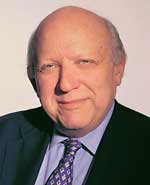Abrams warns of efforts to monitor faculty
By Kevin Brown
First Amendment attorney Floyd Abrams said a move to establish an academic bill of rights (ABR) in 19 states is inappropriate and dangerous, as ABR backers seek to protect students from political or religion-related indoctrination by faculty.
 |
Abrams (Photo courtesy University Senate) |
"It seems to me that having a decent grievance procedure on campus is far better," Abrams said. He warned that lawsuits against faculty could lead to universities monitoring professors for classroom content and expression, to avoid liability.
"When you have free speech you have the potential for the abuse of free speech," Abrams said. "But if you fear legislative or judicial intervention, you lose all benefits of free speech."
Abrams addressed "Whose Academic Freedom?" Oct. 6 at Rackham Auditorium in the 15th Annual University Senate Davis, Markert, Nickerson Lecture on Academic and Intellectual Freedom.
Abrams has defended high-profile First Amendment cases from the Vietnam War-era Pentagon Papers case to campaign finance reform cases and, most recently, the journalists threatened with jail for refusing to disclose their confidential sources. He currently is Visiting Professor of First Amendment Issues at the Columbia University Graduate School of Journalism.
Abrams represents New York Times reporter Judith Miller, who made headlines two weeks ago when she was released from prison after serving 85 days for refusing to identify a source to federal investigators probing the leak of a CIA operative's name.
"Judith Miller has just finished the longest term a journalist has ever served," Abrams said, adding she was freed after the source chose to go public. "For her, the question was, 'I promised a source confidentiality.'"
"The real question is what is the meaning of it all? What is the effect of people talking to the press?" he asked. "In the District of Columbia, the court has ruled there is no protection, none, in a federal grand jury context. In other places in the country, the law is to the contrary. We will see what the impact is on the press, and more importantly on the public."
The move toward establishing ABRs is another important First Amendment issue to be addressed. Abrams said he served as advisor to a Columbia committee appointed to look into a charge by some Jewish students that certain faculty members in the Middle East and Asian Languages and Cultures department taught courses the students believed to be biased and factually incorrect, and alleged that the faculty members had ridiculed students' political views.
"It was appropriate for the university to look into it," Abrams said, adding it's important for students to have access to a wide range of views, and to not be ridiculed or demeaned.
But Abrams warned that enactment of ABR legislation could force a professor teaching evolution to also teach "intelligent design," even though the professor does not believe in the concept.
"This is surely problematic, since a professor should not have a duty to teach an idea that he or she believes to be unworthy of discussion," Abrams said.
Abrams recalled precedents that have protected academic freedom in the United States, starting with an 1819 Supreme Court decision in the Dartmouth College case. At the time, the court overruled the New Hampshire legislature, which had maneuvered to dismiss a professor by altering the college charter to add new members to the board of trustees, among other measures.
The lecture series was established in 1990 by the Senate Advisory Committee on University Affairs (SACUA) to honor three U-M faculty members, Chandler Davis, Clement Markert and Mark Nickerson, who in 1954 were called to testify before a Congressional Committee on Un-American Activities.
All invoked Constitutional rights and refused to answer committee questions about their political associations.
For their actions, the three were suspended and Nickerson was denied the summer portion of his salary. Subsequent hearings and committee actions at U-M resulted in different outcomes. Markert was reinstated; Nickerson, a tenured professor, and Davis were dismissed from the University.
Davis attended the lecture and was recognized by Abrams from the podium.
The lecture was sponsored by the Academic Freedom Lecture Fund, American Association of University Professors-U-M Chapter, Office of the President, Office of Vice President for Communications, Law School and SACUA.
Abrams' most recent book is "Speaking Freely: Trials of the First Amendment," which discusses many of his cases.
|


